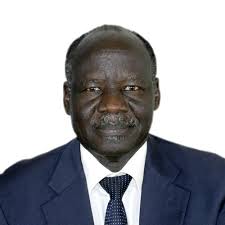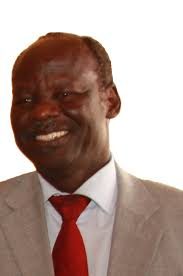Greater Equatoria Region and the Khartoum Agreement
Preamble
Whereas in the beginning it was the declaration of principles for the Transition government to work in the former three capitals of Juba, Wau and Malakal
Whereas the Troika has expressed concerns on a “narrow” and “inclusive” agreement, the warring parties went ahead with initializing the Khartoum Agreement to serve their interests
Reaffirming the desire to reverse the 32 States into the three Greater Regions of Equatoria, Upper Nile and Bahr Gahzel for economic, technical and social reasons
Reassuring the marginalized ethnic communities in South Sudan to hold a referendum on self- determination and opt out to a region of their liking for peaceful coexistence and prosperity
Acknowledging that ARCSS, HLRF and Khartoum Declaration is between Nuer and Dinka ethnicities being blessed by Uganda and hence; SPLM/A reunited
We, the concerned Equatorians in Diaspora think it is time for Greater Equatoria to call a spade a spade and not to suffer any more. The African proverb that says “when two elephants fight, it is the grass that suffers” is the reality in the Greater Equatoria and a situation that has unfolded and is unmanageable and Geater Equatoria is bleeding internally. Equatoria has been the champion of peace since the Addis Ababa Agreement when an Equatorian stepped down for Abel Alier to lead the Ministry for Southern Affairs in 1969. It was an Equatorian rebel again who negotiated peace with his fellow South Sudanese representing the Republic of Sudan and decided to remain in command of the Division (1) Army headquarters in Juba. And it was an Equatoiran in 2005 who stepped down for the sake of unity of South Sudanese. The position being contested between Taban Deng and Riek Macar due to greed and selfishness.
The Concerned Equatorians in Diaspora appreciate the role played by SSOA majority members in not signing the Khartoum Governance Agreement. The Security Academy experts calculated the amount of money to run such a multi-layer of a Transitional Government was in astronomical figures. Such resources would best be utilized in relief, rehabilitation and repatriation of refugees and displaced people abroad and in the Protection of Civilian centres. And hence, is the demand for a lean government that no head of state has listened to nor the IGAD partners.
The warring parties to Khartoum agreement fought in Greater Equatoria Region and managed to expel Equatorians and send them to exile in refugee camps in the neighbouring countries. The security agents in Juba has recruited thousands of young Dinka into the force armed with Israeli machine guns. This is in preparation for demilitarizing the three main towns of Juba, Wau and Malakal to wage the war in case the Nuer take a revenge on their citizens killed in the three main towns. The reasons for the fighting in Juba was claimed to be a coup by Riek that never was; according to the deposed senior Security Officer; Major General Mac Paul. The defection of Paul Malong and his revelation on his mission to hunt down Riek Macar brought light to the hidden agenda of the Jieng Council of Elders and its allied militias.
Riek Macar has agreed with his adverse rival Paul Malong (my enemy’s enemy is my friend) to secure his tenure in government for fear of Taban Deng Gai and the Jieng Council of Elders strategy for ruling South Sudan. We have now seen dissent upon Equatorians working for International NGOs and UN
bodies in other parts of South Sudan who are now being expelled, assaulted and maimed by the youth in these regions due to hatred and NGOs being warned in advance of such attacks. The recent attacks in Maban is a case in point for the IGAD, Troika and International Community to witness. The burning of huts in Adjumani refugee camps due to one Dinka youth raping a local girl and frictions with Nuers in the camps have caused insecurity in refugee camps. Previously, there were hate messages from the youths in Bahr Gahzel (Aweil) and Bor communities warning Equatorians not to step into their regions.
It is now evident that Greater Equatoria should reassess its position as regards the way forward in SSOA, and as concerned Equatorians in Diaspora, would request and Equatorian leadership to take the bull by its horn. We sincerely, thanked brothers Hon. Lam Akol and Hon. Gabriel Changson Chang for a job well done and who stood for integrity of SSOA and not for personal gains as in 1947 where it was believed money was being ditched around and history is repeating itself in Soba in 2018.
Equatorians in Diaspora would certainly want organizations under the umbrella of SSOA to come up explicitly condemning the move by Riek to have betrayed the cause of the suffering masses of people of South Sudan similar to PDM, NAS and FDs. Those acting like ostriches and thinking SSOA’s actions of expelling SSUM is enough is not an excuse. SSOA now needs a firm and steadfast policies and procedures to be spelt out for its next round of talks. We propose that the leadership of SSOA should now be headed by an Equatorian in Diaspora so that his motives are not compromised by being within the IGAD countries.
If there is a renegotiations of the Khartoum Agreement by Friends of South Sudan, AU and the Troika for inclusivity; it is essential that whole agreement is put back to the table and renegotiated by all stakeholders of South Sudanese parties, civil society in Diaspora and non-violent political parties in a level playing field. Unlike the talks that were carried out in Khartoum and while the SPLA/M was being unified in Entebbe and business as usual. It is a well-known secret in Juba that when the SPLA/M unites, it loots the coffers of the government and when they disagree they vent their anger on the innocent people who eventually are killed and properties destroyed. SSOA and its allies should be allowed to nominate its own eminent people to advocate for them and enjoy the same privileges as those nominated by IGAD and the government in Juba.
In conclusion, the Concerned Equatorians in Diaspora would like to reiterate its position of renegotiating the Khartoum Agreement as SSOA was unfairly represented in the talks and that the different organizations are lumped together with the exception of the Former Detainees (FDs). As initializing the document was between a united groups of SPLM/IO and SPLM/IN and thus, this body should now be unified to face the rest of the South Sudanese oppositions. Unless, we are to believe that the war is between Nuer and Dinka ethnicities and the rest of Greater Equatoria are spectators! And this is true when the Jieng and Nuer Council of Elders approached former President Daniel Arap Moi for mediation in Kenya. We strongly believe that the mediators should revisit the submission by the parties under the umbrella of SSOA for a lasting and sustainable peace as now Riek and Kiir has been reunited in Entebbe and Khartoum.
Concerned Equatorians in Diaspora
Date 27th July, 2018.
A non-violent body and a watchful of eye for atrocities, human rights abuse, hate and war crimes committed in Greater Equatoria Region and advocating good governance and accountability for a sustainable development.
Editor’s Note: The views expressed in the “Documents Page” are solely the opinions of the writers. The veracity of any claims made are the responsibility of the author’s and are not necessarily endorsed by The Malakal Post. The Malakal Post, reserves the right to edit articles before publication. If you would like to submit an opinion article or analysis, please email your article at: info@malakalpost.com















